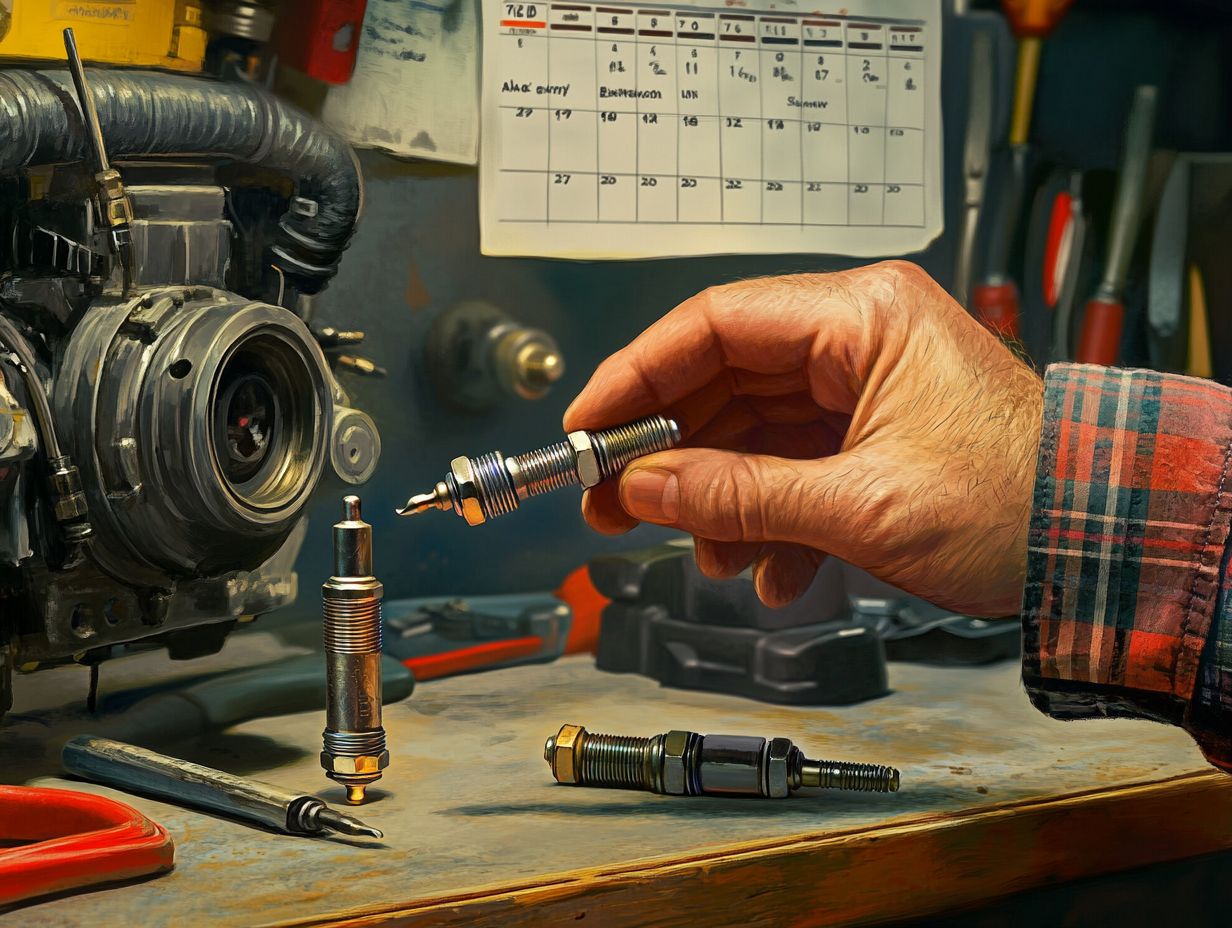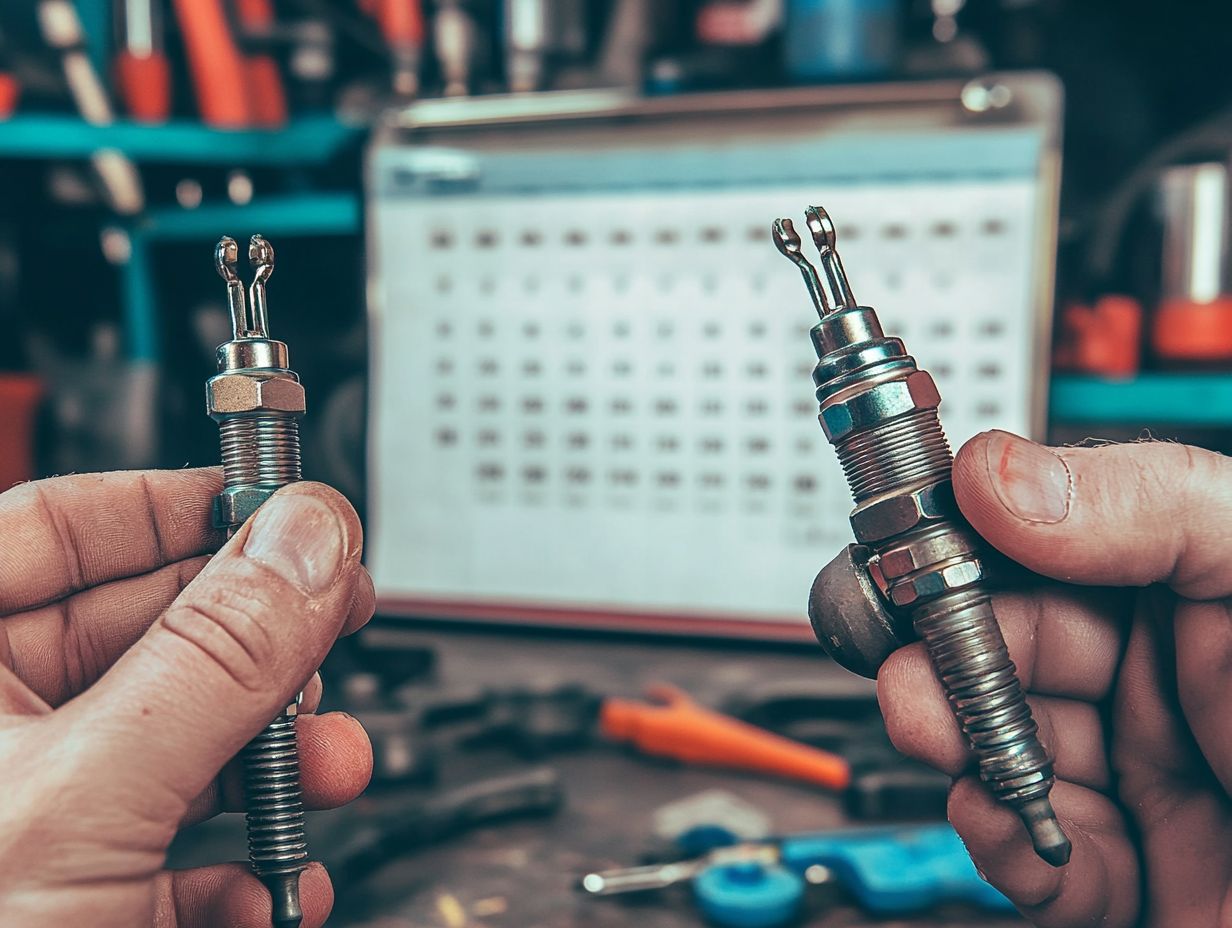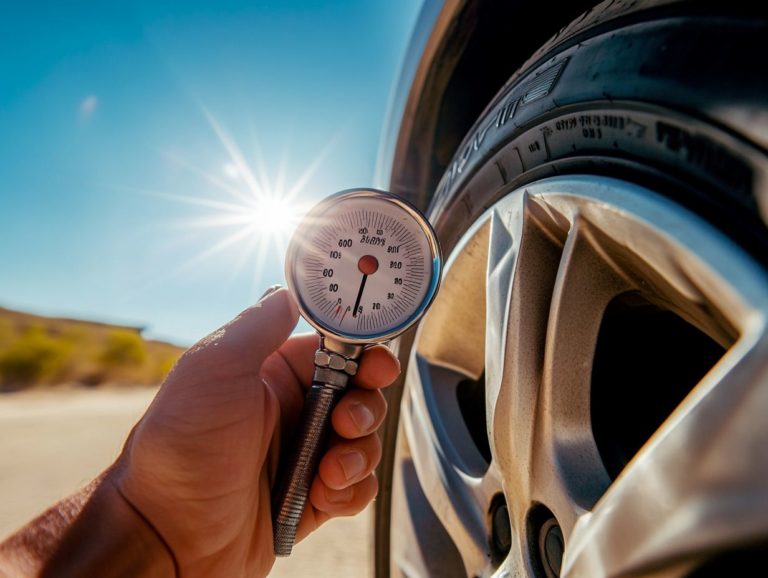How Often Should You Change Your Spark Plugs?
Spark plugs are essential to your vehicle’s performance. They ignite the air-fuel mixture that powers your engine.
Learn to recognize when your spark plugs need replacing. You ll also find out how long they last and whether you should replace them yourself or hire a pro.
Prepare to ensure your engine runs smoothly and efficiently!
Contents
Key Takeaways:

- Regularly changing your spark plugs improves performance and fuel efficiency.
- Signs of worn spark plugs include poor acceleration and rough idling.
- Change spark plugs every 30,000 miles or as your manufacturer advises.
Understanding Spark Plugs
Understanding spark plugs is crucial for maintaining optimal engine performance in vehicles like the Toyota Corolla and Toyota Sienna. These small yet powerful components play a vital role in the ignition system, producing a spark to ignite the fuel in the area where it burns in your engine.
By ensuring efficient fuel combustion, spark plugs directly influence fuel economy and overall vehicle performance. When spark plug functionality falters, it can lead to engine misfires, rough idling, and decreased fuel efficiency. This makes it vital for vehicle owners to appreciate their significance and know when replacements are necessary.
What are Spark Plugs and How Do They Work?
Spark plugs are crucial components of your internal combustion engine. They ignite the air-fuel mixture within the combustion chamber through an electrical arc generated by the ignition coil.
Typically, their structure includes a central electrode, an insulator, and a ground electrode, crafted from materials such as copper, platinum, or even iridium. Each material offers its own advantages: copper has excellent conductivity but wears out quickly, while platinum and iridium are designed for longevity and efficiency.
The design and quality of spark plugs significantly impact ignition reliability, engine performance, and, ultimately, fuel economy. Regular maintenance, including timely spark plug replacements, is essential for ensuring smooth engine operation and optimal fuel utilization, enhancing your vehicle’s overall performance.
Signs that Your Spark Plugs Need to Be Changed
Recognizing the signs that your spark plugs need replacement is crucial for maintaining optimal vehicle performance and preventing serious engine issues. You might notice the malfunction indicator light or check engine light glowing on your dashboard, signaling potential problems, including misfires.
If you experience rough idling, sluggish acceleration, or difficulty starting your vehicle, these are critical indicators of worn spark plugs that demand your immediate attention.
Common Red Flags
Red flags that indicate your spark plugs might need replacement include symptoms such as engine misfire, poor fuel economy, and rough idling. Each of these can compromise your vehicle’s overall performance.
For instance, an engine misfire may cause your car to shake unexpectedly, signaling a disruption in the combustion process. This can lead to frustrating decreases in acceleration and a concerning loss of power, especially when merging onto highways.
If you find yourself visiting the gas station more often, it s a clear sign of poor fuel economy. This not only strains your budget but also increases exhaust emissions a telltale sign of inefficiency that should not be ignored.
Rough idling results in a bumpy and uncomfortable driving experience, hinting at possible issues with engine operation. These symptoms impact safety and can lead to more severe mechanical problems if left unaddressed.
Factors that Affect Spark Plug Lifespan

The lifespan of spark plugs is influenced by various factors, including environmental conditions, your driving habits, and your commitment to regular maintenance. Each of these elements significantly impacts your engine’s performance and fuel economy.
Environmental and Driving Conditions
Your driving habits and the weather can wear out spark plugs faster. Extreme temperatures and humidity can contribute to this wear and tear.
In urban areas, where you often navigate stop-and-go traffic, your spark plugs may accumulate deposits due to inefficient combustion, causing clogging that happens sooner than expected. In contrast, rural driving typically involves smoother acceleration and consistent speeds, providing a more forgiving environment for these vital components.
Temperature and humidity fluctuations can intensify wear, no matter where you are. To mitigate potential issues, adopt a routine vehicle maintenance regimen like timely oil changes, air filter replacements, and regular spark plug inspections. These actions can enhance engine performance and extend the life of your spark plugs, ensuring a smoother and more efficient ride.
How Often Should You Change Your Spark Plugs?
Knowing how often to change your spark plugs is crucial for maintaining your vehicle’s performance and ensuring its longevity. Recommendations can vary based on your vehicle model, the spark plug manufacturers, and your maintenance schedule.
Recommended Maintenance Schedule
A typical maintenance schedule suggests replacing spark plugs every 30,000 to 100,000 miles, depending on your vehicle model think of cars like the Toyota Corolla or Toyota Sienna.
Understanding your vehicle’s specific requirements can greatly enhance engine efficiency and longevity. For instance, while traditional copper spark plugs might need replacement every 30,000 miles, iridium or platinum spark plugs can often last up to 100,000 miles without any issues.
For models like the Honda Civic or Ford F-150, sticking to these schedules is essential. Delays in replacing spark plugs can lead to misfires and decreased fuel economy, possibly leading to serious engine issues. Regular checks ensure peak performance and help you avoid costly repairs down the line.
DIY vs Professional Spark Plug Replacement
When considering spark plug replacement, you often face a crossroads: Should you tackle the task yourself or enlist a professional? Each choice has distinct advantages and drawbacks, so it s essential to weigh your options carefully.
Pros and Cons of Each Option

Replacing spark plugs yourself can provide cost savings and the rewarding experience of executing your own automotive repair. However, keep in mind that you may need specialized tools and face the risk of making mistakes that could lead to engine problems.
Taking on this task can deepen your understanding of your vehicle’s inner workings, which many find incredibly rewarding. Yet, it s crucial to recognize that improperly installed spark plugs can lead to misfiring and reduced fuel efficiency, resulting in potentially costly engine damage.
Conversely, hiring professionals ensures the job is done efficiently and accurately, often improving overall engine performance. However, this convenience comes at a premium price and may involve longer wait times something that might not fit well with your busy schedule.
Steps to Change Your Spark Plugs
Changing spark plugs can transform your ride when you have the right tools and follow the proper steps. This meticulous approach guarantees optimal installation, enhancing your engine’s performance.
Don’t wait check your spark plugs today for a smoother, more efficient ride!
Tools and Techniques for Successful Replacement
To achieve a successful spark plug replacement, you must equip yourself with the right tools, such as a spark plug socket, and use the right techniques to ensure secure electrical connections.
Alongside a spark plug socket, which provides the necessary grip to remove and install spark plugs without inflicting damage, you ll also require a ratchet or breaker bar for added leverage. A torque wrench is essential for tightening the plugs to the manufacturer s specifications, helping you avoid the pitfalls of over or under-tightening.
Remember to have insulated pliers on hand for safely handling wires, as well as dielectric grease, a special grease that helps seal connections and keeps moisture out. It s also crucial to clean the area around the spark plugs before removal to ensure no debris enters the combustion chamber, which could result in costly engine repairs.
Frequently Asked Questions
How Often Should You Change Your Spark Plugs?
The general recommendation is to change your spark plugs every 30,000 miles or every 2-3 years, whichever comes first. However, this can vary depending on your vehicle’s make and model, so it’s best to consult your owner’s manual for specific recommendations. For more detailed guidance, check out how to know when to change your spark plugs.
Why do I need to change my spark plugs?

Spark plugs play a crucial role in the ignition process of your vehicle. Over time, they can become worn or dirty, leading to misfires, decreased fuel efficiency, and even engine damage. Regularly changing your spark plugs ensures optimal engine performance and prevents potential issues.
How can I tell if my spark plugs need to be changed?
If you notice your engine is running rough, or your vehicle is struggling to start, it may be time to change your spark plugs. If you’ve reached the recommended mileage or time interval, check and replace your spark plugs if needed.
Can I change my spark plugs myself?
While changing your spark plugs is a fairly simple task, it does require some basic knowledge and tools. With a little patience and the right tools, you can do it yourself! If you’re not confident in your abilities, it’s best to have a professional mechanic handle it for you. However, if you’re comfortable working on your vehicle, you can find step-by-step guides online to help you through the process.
What happens if I don’t change my spark plugs?
If you ignore your spark plugs, you could face serious issues like engine damage and costly repairs. Don’t wait until it s too late change them regularly!
Can I use any spark plugs for my vehicle?
No, it’s important to use the correct type of spark plugs for your specific vehicle. The wrong type can cause damage to your engine and affect performance. Consult your owner’s manual or a trusted mechanic to ensure you’re using the right spark plugs for your vehicle.
Take charge of your vehicle’s health get those spark plugs checked today!






